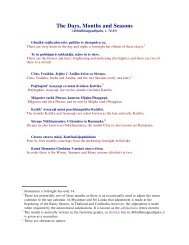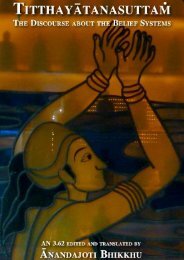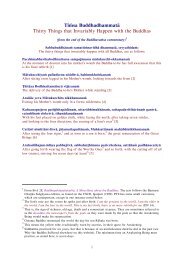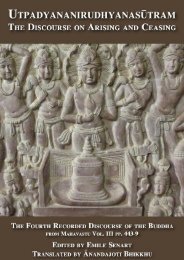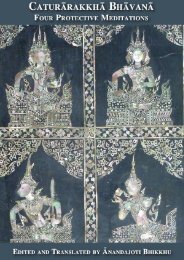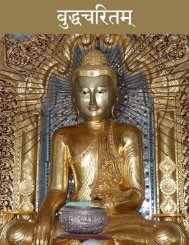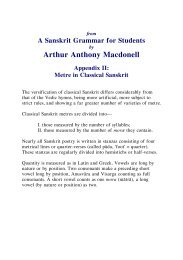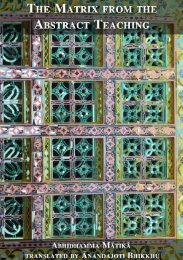BhikkhunÄ«saá¹yutta Thematic Discourses about Nuns - Ancient ...
BhikkhunÄ«saá¹yutta Thematic Discourses about Nuns - Ancient ...
BhikkhunÄ«saá¹yutta Thematic Discourses about Nuns - Ancient ...
Create successful ePaper yourself
Turn your PDF publications into a flip-book with our unique Google optimized e-Paper software.
The <strong>Thematic</strong> <strong>Discourses</strong> <strong>about</strong> <strong>Nuns</strong> - 23<br />
“Kiṁ nu uddissa muṇḍāsi, samaṇī viya dissasi,<br />
“On whose account was your head shaved, as you look like an ascetic, 43<br />
Na ca rocesi pāsaṇḍaṁ, kim-iva carasi momuhā?” ti<br />
You don’t rejoice in heresy, why (then) do you live like a fool?” 44<br />
“Ito bahiddhā pāsaṇḍā diṭṭhīsu pasīdanti te,<br />
“Outside of this 45 there are heretics 46 who are stuck fast 47 in their views,<br />
Na tesaṁ Dhammaṁ rocemi, na te Dhammassa kovidā.<br />
In their Dhamma I am not pleased, their Dhamma is lacking in skill.<br />
Atthi Sakyakule jāto Buddho appaṭipuggalo,<br />
An unmatched Awakened One is born in the Sakya family, 48<br />
Sabbābhibhū Māranudo, sabbattham-aparājito.<br />
Lord of all, 49 dispelling Māra, 50 undefeated in every place. 51<br />
Sabbattha mutto asito, sabbaṁ passati Cakkhumā,<br />
Free from all things, 52 independent, 53 the Visionary who sees all,<br />
43 Comm: samaṇī viya dissasī ti samaṇisadisā dissasi; as you look like an ascetic means you<br />
look the same as an ascetic.<br />
44 Comm: kim-iva carasi momūhā ti kiṁ kāraṇā momūhā viya carasi? why (then) do you live<br />
like a fool? means why, for what reason, do you live like a fool?<br />
45 Comm: ito bahiddhā ti imamhā Sāsanā bahi; outside of this means outside of this Teaching.<br />
46 Comm: pāsaṁ ḍentī ti pāsaṇḍā, sattānaṁ cittesu diṭṭhipāsaṁ khipantī ti attho. Sāsanaṁ<br />
pana pāse moceti tasmā pāsaṇḍo ti na vuccati, ito bahiddhā yeva pāsaṇḍā honti; caught in a<br />
snare they are heretics, the meaning is these beings have fallen into a snare of views in their<br />
minds. But the (Buddha's) Teaching is free from snares therefore it is not called a heresy,<br />
outside of this there are surely heretics. This is a play on words deriving pāsaṇḍa (heresy)<br />
from pāsa (snare), which hardly works in translation.<br />
47 Comm: pasīdantī ti saṁsīdanti lagganti; stuck fast means sinking down, getting attached.<br />
48 Comm: idāni “kaṁ nu uddissa muṇḍāsī?” ti pañhaṁ kathentī atthi Sakyakule jāto ti ādimāha;<br />
now speaking in answer to “on whose account was your head shaved?” born in the<br />
Sakya family and so on was said.<br />
49 Comm: tattha sabbābhibhū ti sabbāni khandhāyatanadhātubhavayonigati-ādīni abhibhavitvā<br />
ṭhito; herein Lord of all means he stands having overcome all destinations, realms or states<br />
involving the constituents, the sense spheres or the elements.<br />
50 Comm: Maraṇamārādayo nudi nīharī ti Māranudo; expelling, driving away Māra as death<br />
and so on he is dispelling Māra.<br />
51 Comm: sabbatthamaparājito ti sabbesu rāgādīsu vā Mārayuddhe vā ajito; undefeated in<br />
every place means he is undefeated in the war with Māra or (undefeated) by all the passions<br />
and so on.<br />
52 Comm: sabbattha mutto ti sabbesu khandhādīsu mutto; free from all things means free from<br />
all constituents and so on.<br />
53 Comm: asito ti taṇhādiṭṭhinissayena anissito; independent means independent of the<br />
dependence on craving and views.




